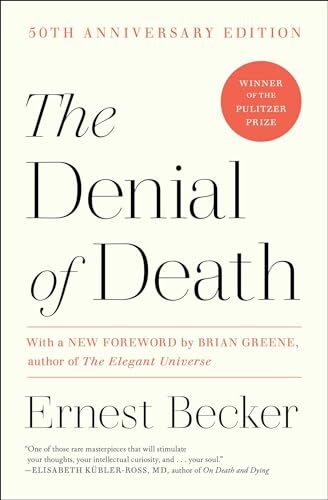
A book full of powerful, important ideas that could have a major impact on how you see the world, all wrapped in dense, academic writing that is not particularly accessible to (and to be fair, probably not written for) those outside the psychology/philosophy fields. It’s worth reading, but be prepared to tune out some of the crappier parts (awkward ass-kissing of many eminent psychologists, including an obsession with Freud and Rank; a very male-centric view of the world; treating homosexuality as a neurosis; lots of pure speculation about human development, with no scientific backing whatsoever), so you can focus on the key ideas:
Two worlds
Human beings are torn between two worlds:
- The world of thought and mind, which seems perfect and endless.
- The world of the body, which is gross and dies.
We are self-aware, conscious beings, who can contemplate the beauty of philosophy, math, and art, but we are also constantly faced with the grossness of our bodies: of sweat, hair, poop, disease, decay, and death.
Death is overwhelming
- This reality of life—knowing that we are going to die and disappear entirely—is too overwhelming for humans.
- If we faced the truth of the world head on every day, it would crush us.
- As a result, to be able to function in this world, we have to lie to ourselves.
- We have to create an illusion where we matter; a narrative where we are the hero; an “immortality project” that allows us to live on forever.
Immortality projects
- These immortality projects are a central driver of everything people do.
- Almost every aspect of human civilization is defense mechanism against the knowledge of our own mortality.
- People believe in religion, have kids, write books, start companies, and build nations all in an effort to create the illusion that you can live forever.
When immortality projects go wrong
- Many of the problems of man, such as war and genocide, are the result of multiple conflicting immortality projects clashing.
- Many mental conditions, such as neurosis, anxiety, and schizophrenia are the result of failing to sustain an illusion, and being faced with the reality of life.
What should you believe?
- Therefore, the central question of humanity is what illusions should we believe?
- What lies should we tell to ourselves to create the best possible life?
Quotes
As always, I’ve saved some of my favorite quotes from the book:
The irony of man’s condition is that the deepest need is to be free of the anxiety of death and annihilation; but it is life itself which awakens it, and so we must shrink from being fully alive.
Yet, at the same time, as the Eastern sages also knew, man is a worm and food for worms. This is the paradox: he is out of nature and hopelessly in it; he is dual, up in the stars and yet housed in a heart-pumping, breath-gasping body that once belonged to a fish and still carries the gill-marks to prove it. His body is a material fleshy casing that is alien to him in many ways—the strangest and most repugnant way being that it aches and bleeds and will decay and die. Man is literally split in two: he has an awareness of his own splendid uniqueness in that he sticks out of nature with a towering majesty, and yet he goes back into the ground a few feet in order to blindly and dumbly rot and disappear forever. It is a terrifying dilemma to be in and to have to live with.
…Erich Fromm wondered why most people did not become insane in the face of the existential contradiction between a symbolic self, that seems to give man infinite worth in a timeless scheme of things, and a body that is worth about 98¢.
The neurotic opts out of life because he is having trouble maintaining his illusions about it, which proves nothing less than that life is possible only with illusions.
What does it mean to be a self-conscious animal? The idea is ludicrous, if it is not monstrous. It means to know that one is food for worms. This is the terror: to have emerged from nothing, to have a name, consciousness of self, deep inner feelings, an excruciating inner yearning for life and self-expression and with all this yet to die. It seems like a hoax, which is why one type of cultural man rebels openly against the idea of God. What kind of deity would crate such a complex and fancy worm food?
“Inter faeces et urinam nascimur. (We are born between shit and piss.)” ― Augustine of Hippo
[…] we all see the world through obsessive eyes at least part of the time and to some degree; and as Freud said, not only neurotics take exception to the fact that “we are born between urine and feces.” In this horror of the incongruity of man Swift the poet gives more tormented voice to the dilemma that haunts us all, and it is worth summing it up one final time: Excreting is the curse that threatens madness because it shows man his abject finitude, his physicalness, the likely unreality of his hopes and dreams. But even more immediately, it represents man’s utter bafflement at the sheer non-sense of creation: to fashion the sublime miracle of the human face, the mysterium tremendum of radiant female beauty, the veritable goddesses that beautiful women are; to bring this out of nothing, out of the void, and make it shine in noonday; to take such a miracle and put miracles again within it, deep in the mystery of eyes that peer out-the eye that gave even the dry Darwin a chill; to do all this, and to combine it with an anus that shits! It is too much. Nature mocks us, and poets live in torture.
We are gods with anuses.
